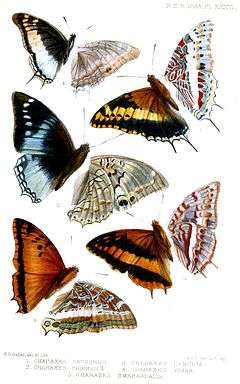Charaxes phoebus
| Charaxes phoebus | |
|---|---|
| | |
| Scientific classification | |
| Kingdom: | Animalia |
| Phylum: | Arthropoda |
| Class: | Insecta |
| Order: | Lepidoptera |
| Family: | Nymphalidae |
| Genus: | Charaxes |
| Species: | C. phoebus |
| Binomial name | |
| Charaxes phoebus Butler, 1866[1] | |
Charaxes phoebus is a butterfly in the Nymphalidae family. It is found in Ethiopia.[2] The habitat consists of montane forests and woodland.
The larvae feed on Bersama abyssinica.
Description

Charaxes phoebus, sp. n. (PI. XXXVL fig. 2.)
Upper side
Front wings ferruginous, paler just beyond the middle, with a broad submarginal black band along the outer margin; apical part of submarginal edge intersected with black at the nervures; a triangular black spot, its base resting upon the first subcostal nervule near the apex; a black elongate spot closing the cell; two spots, one above the cell, the other halfway between the subapical spot and the end of the cell; two black spots placed obliquely just below the end of the cell. Hind wings as above, but without any spots,and with black marginal edge. Body ferruginous.
Underside
Reddish olivaceous, basal half curiously marked with silvery spots and streaks with dark centres; central band silvery, very narrow, tapering from the inner margin of hind wing near the anal angle to the front margin of anterior wing near the apex. Front wings with a submarginal row of eight dusky black spots between the nervules along the outer margin; a row of six dusky spots on the central band. Hind wings with a submarginal olivaceous band varied with silver; anal angle ochreous, enclosing a violaceous spot.
Hab. Abyssinia. B.M.[3]
Taxonomy
The members of the Charaxes jasius group are:
- Charaxes jasius
- Charaxes pelias – smaller than jasius
- Charaxes hansali
- Charaxes castor
- Charaxes brutus – dark with white bands
- Charaxes andara – Madagascar
- Charaxes ansorgei
- Charaxes phoebus
- Charaxes pollux
- Charaxes druceanus
- Charaxes phraortes – Madagascar, close to next
- Charaxes andranodorus – close to last
- Charaxes eudoxus
- Charaxes richelmanni
References
| Wikimedia Commons has media related to Charaxes phoebus. |
| Wikispecies has information related to: Charaxes phoebus |
- ↑ Charaxes, Site of Markku Savela
- ↑ Afrotropical Butterflies: File H - Charaxinae - Tribe Charaxini
- ↑ Butler, A.G. (1866a): Monograph of the species of Charaxes, a genus of diurnal Lepidoptera. Proceedings of the Zoological Society of London 1865:622-639.
- Victor Gurney Logan Van Someren, 1970 Revisional notes on African Charaxes (Lepidoptera: Nymphalidae). Part VI. Bulletin of the British Museum (Natural History) (Entomology)197-250.
External links
- Images of C. phoebus Royal Museum for Central Africa (Albertine Rift Project)
- Charaxes phoebus images at Consortium for the Barcode of Life